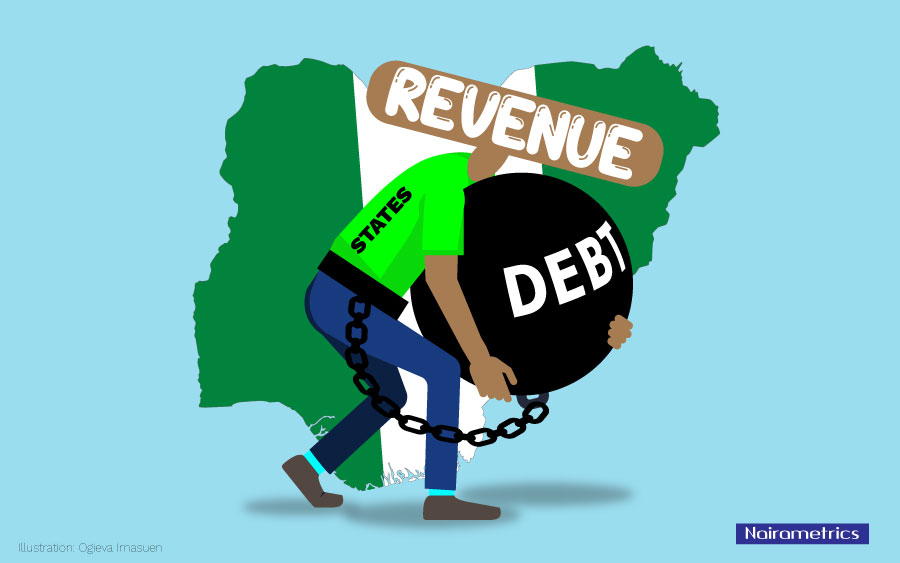Featured
Explained: Buhari’s $6.2bn loan request could raise public debt to N36.4trn
Published
5 years agoon

Buhari’s $6.2bn loan request could raise public debt to N36.4trn
Read Also:
Despite coming as a key component of the 2021 Appropriation Act, the request of President Muhammadu Buhari seeking Senate’s approval for a $6.2 billion loan is generating concerns as it will further inflate Nigeria’s public debt stock.
The President in a letter addressed to the President of Senate, Dr Ahmad Lawan, and read at plenary on Tuesday sought the approval of an external loan of $6.183 billion, to fund the deficit of N5.602 trillion in the 2021 budget.
Although, President Buhari said the request was in line with the provisions of sections 21(1) and 27(1) of the Debt Management Office (DMO) Establishment Act 2003, the fear of servicing huge debt and eventual repayment of the principal loan amidst oscillating cash flow has gripped concerned experts.
According to the president, the loan would be sourced from a combination of multilateral and bilateral lenders and the International Capital Market (ICM) through the issuance of Eurobonds.
He said accessing the ICM would be relatively cheaper, thereby moderating debt service costs and ensuring the increase in external reserve
What you should know
On December 31, 2020, President Muhammadu Buhari had signed the 2021 Appropriation Bill into law. Tagged “Budget of Economic Recovery and Resilience,” the budget is estimated at N13.59 trillion.
Its components include non-debt recurrent expenditure of N5.64 trillion and N4.13 trillion for capital expenditure (capex).
Based on the expected estimated total revenue of N7.89 trillion, the 2021 budget has a deficit of N5.70 trillion, representing 3.99 per cent of estimated gross domestic product (GDP).
The federal government had also explained that the deficit would be financed mainly by borrowings of N4.69 trillion, privatization proceeds of N205.15 billion and finally project linked bilateral & multilateral loans of N709.69 billion.
A further analysis of the 2021 appropriation bill shows that 24 per cent of the total expenditure is designated for debt servicing.
Observations and fears
Experts in various quarters have observed that over the years, the Federal Government has struggled to finance its budget mainly due to low revenue, which is susceptible to oil price volatilities.
For instance, the Federal Government only generated 68 per cent of its expected budgeted revenue of N4.75 trillion as at July 2020 despite adjusting the official exchange rate for revenue conversion to N360/US$1 from N306/US$1 previously.
This has resulted in an increasing budget deficit for the country and increased borrowing by the government from both domestic and international bodies.
The Debt Management Office (DMO) and the National Bureau of Statistics (NBS) reported in March this year that as at December, 2020, the public debt profile of the country stood at N32.92 trillion.
Of the total amount, N12.71 trillion or 38.60 per cent of the debt was external while N20.21 trillion or 61.40 per cent of the debt was domestic.
Business Metrics also reported that following the Nigerian Senate’s approval of a fresh N1.1 trillion loan for the federal government in April, the public debt stock for the country could hit a new height of approximately N34 trillion.
The said loan, which was approved by the two federal legislative houses, included the external loan of $1.5 billion (about N571.5 billion) and €995 million (about N528.4 billion).
Adding the $6.2bn loan to the debt burden
When eventually approved by the senate, the $6.2 billion loan proposed by President Buhari, which is equivalent to N2.4 trillion based on the N380 exchange rate last updated May 10 on the official website of the Central Bank of Nigeria (CBN), would jack up the country’s public debt burden to circa N36.4 trillion.
Whilst debt to GDP ratio remains within the acceptable threshold, experts are increasingly concerned about the nation’s debt service to revenue ratio which shows the country may be heading towards a debt crisis, should the borrowings continue in face of limited finances to support existing debt obligations.
Worried by the imbalance in revenue flow and debt obligations, financial analysts at CSL Research noted that the Federal Government typically exceeds its budgeted deficit for a budget year.
“This is amidst our pessimism on the Federal government’s ability to achieve its Revenue target of N7.89 trillion in 2021 (the highest in the history of Nigeria),” according to the analysts.
They advised the government needs to focus its expenditure on capital projects expected to generate cashflows for the economy.
“Also, there is the need for more collaboration between private enterprises and the government to ease the burden of increasing costs borne by the government. In addition, attention must be paid to the efficiency and effectiveness of government spending,” they added.
Share this:
- Click to share on X (Opens in new window) X
- Click to share on Facebook (Opens in new window) Facebook
- Click to share on WhatsApp (Opens in new window) WhatsApp
- Click to share on Pocket (Opens in new window) Pocket
- Click to share on Telegram (Opens in new window) Telegram
- Click to email a link to a friend (Opens in new window) Email
- Click to share on LinkedIn (Opens in new window) LinkedIn
You may like


Nigeria’s Public Debt Increased by N24.33 Trillion, Hits N121.7 Trillion


Buhari’s Huge Parting Debt Profile


JUST IN: CBN Says Old Naira Notes Remain Legal Tender


Tinubu: Take Your Case to Court, Not the Streets – Buhari Tells Atiku, Obi


LIST: Buhari Forwards 7 Names to Senate for Confirmation as ICPC Commissioners


Buhari, Osinbajo, Emefiele To Headline CIBN Conference












